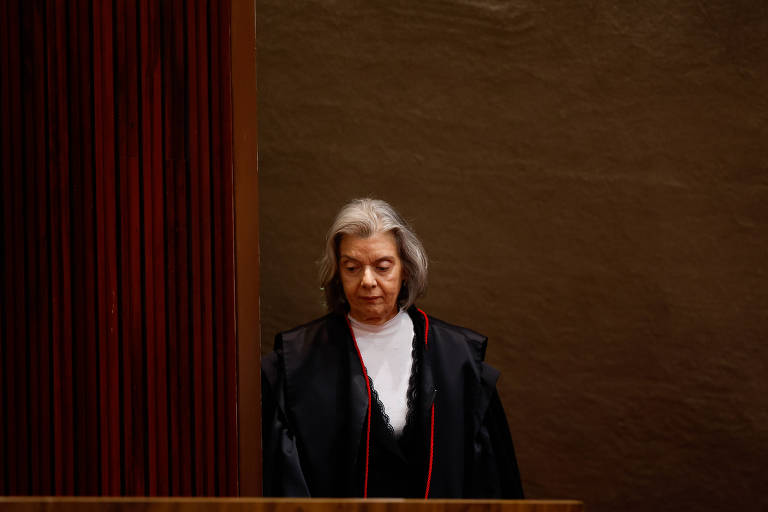Cármen Lucia enters her second year as president of the Superior Electoral Court (TSE) under pressure to unblock the court's agenda.

Justice Cármen Lúcia enters her second year as president of the TSE (Superior Electoral Court) under pressure from colleagues, lawyers, and court observers to clear the court's caseload and move forward with important cases to be decided before the 2026 elections.
In the first half of this year, the electoral court suffered from dehydrated sessions, cases of little relevance and many trials in lists—that is, in blocks—, leaving more relevant cases without a schedule of being scheduled.
Among them are urgent actions involving the possible impeachment of the governors of Rio de Janeiro, Claudio Castro ( PL ), and Roraima, Antonio Denarium (PP). There is no date set for review of either case.

The action against Castro is related to the appointment of the governor's allies and campaign workers to a Rio foundation and suspicions about a secret payroll, revealed by UOL reports in 2022.
Denarium's case concerns alleged abuse of economic power in the 2022 elections, including alleged use of public funds to support the governor's reelection and the electoral misuse of social programs. Both governors deny any wrongdoing.
Another action ready to be judged by the TSE is the one that requests the revocation of the mandate of Senator Jorge Seif (PL-SC) , paralyzed in April 2024.
At the time, new investigations were ordered in the case, aiming to support a court decision on the allegations of abuse of economic power against the congressman. He denies any wrongdoing.
These are some of the actions identified as priorities by members of the court and people following the processes, and which need to be resolved before the pre-election period.
When contacted through the TSE's press office, Minister Cármen Lúcia did not respond.
The TSE is composed of seven full members, who occupy their seats on a rotating basis. Three members are from the STF (Supreme Federal Court), like Cármen, two from the STJ (Superior Court of Justice), and two from the so-called legal profession—members of the legal profession.
Cármen, who succeeded Alexandre de Moraes as head of the TSE in June last year, is expected to remain in the post until the same month of 2026, when she will hand over the presidency to Kassio Nunes Marques .
Even before becoming president, the minister helped develop measures to combat campaign fraud through the use of artificial intelligence. Later, she oversaw a municipal election that she described, in celebratory tones, as "democratically dull."
She avoided, however, commenting on suspicions of widespread fraud in small and medium-sized municipalities in the country and said she saw no flaw in the election.
As Folha reports revealed, in cities across several states there were signs of mass vote buying through the collective and illegal transfer of voter registration cards between one city and another.
In the first half of this year, one of Cármen's main concerns was to put together a new composition for the court , with the creation of a list of women only for one of the court's titular positions, sent to President Lula (PT) for selection.
Cármen argued that with the departure of STJ (Superior Court of Justice) minister Isabel Gallotti and herself from the court by next year, the TSE would be left with seven men as full members.
Lula ended up choosing Estela Aranha from the list, which was considered a personal choice by Cármen and related to the minister's priorities in her administration.
Estela is a former Secretary of Digital Rights at the Ministry of Justice and is considered a candidate to participate in an election in which issues related to big tech and artificial intelligence will be relevant.
The expectation now is that, with the current composition of the court's members, Cármen will be able to schedule the analysis of important cases in the court.
Currently, the court is composed of Cármen herself, Kassio, and André Mendonça from the Supreme Court. The Superior Court of Justice (STJ) members are Gallotti and Antônio Carlos Ferreira. The legal profession's members, starting this month, will be Floriano Azevedo and Estela.
Other important actions that may be judged in the coming months are the so-called "magic words," which establish what constitutes early electoral propaganda.
Furthermore, another issue that may be discussed in court is suspicions of using funds from parliamentary amendments as indirect campaign financing.
uol

![<![CDATA[ Jorge Gabriel cada vez mais afastado dos filhos ]]>](/_next/image?url=https%3A%2F%2Fcdn.cmjornal.pt%2Fimages%2F2025-08%2Fimg_1280x718uu2025-08-01-17-31-10-2226515.jpg&w=3840&q=100)
![<![CDATA[ Pais de crianças com cancro reclamam respostas do Governo ]]>](/_next/image?url=https%3A%2F%2Fcdn.cmjornal.pt%2Fimages%2F2025-08%2Fimg_1280x721uu2025-08-01-17-35-08-2226520.jpg&w=3840&q=100)
![<![CDATA[ Estudante de Engenharia mata em encontro casual ]]>](/_next/image?url=https%3A%2F%2Fcdn.cmjornal.pt%2Fimages%2F2025-07%2Fimg_1280x721uu2025-07-30-11-01-20-2226004-im-638896717408000554.jpg&w=3840&q=100)
![<![CDATA[ Bukele perpetua-se no poder ]]>](/_next/image?url=https%3A%2F%2Fcdn.cmjornal.pt%2Fimages%2F2025-08%2Fimg_1280x721uu2025-08-01-16-53-28-2226505.jpg&w=3840&q=100)
![<![CDATA[ "Reconhecer a Palestina é recompensar o Hamas": Embaixador de Israel em Portugal sobre decisão do Governo luso ]]>](/_next/image?url=https%3A%2F%2Fcdn.cmjornal.pt%2Fimages%2F2025-08%2Fimg_1280x721uu2025-08-01-21-45-29-2226589.jpg&w=3840&q=100)